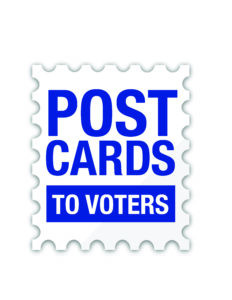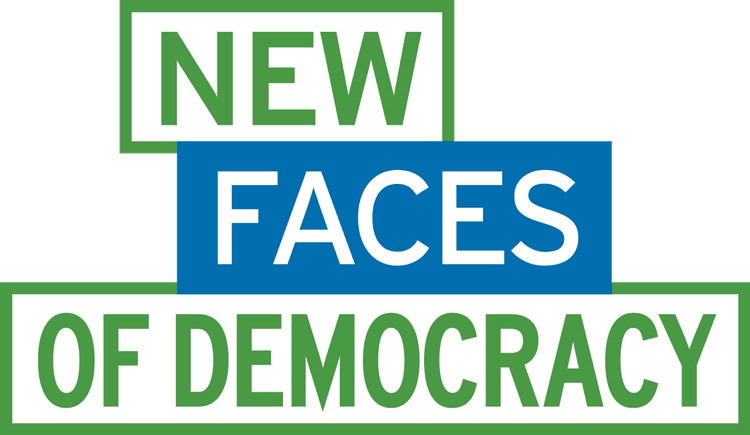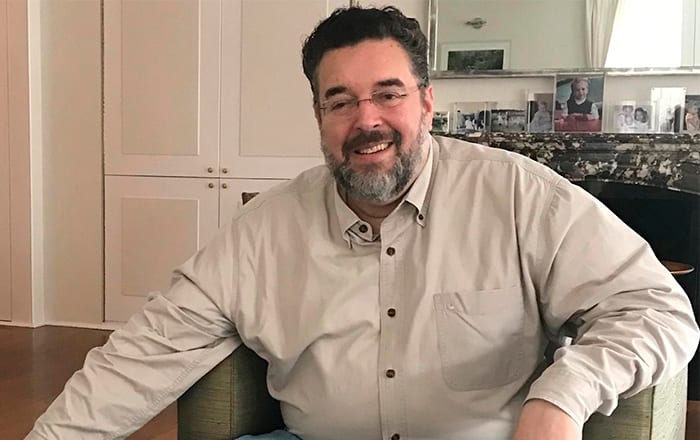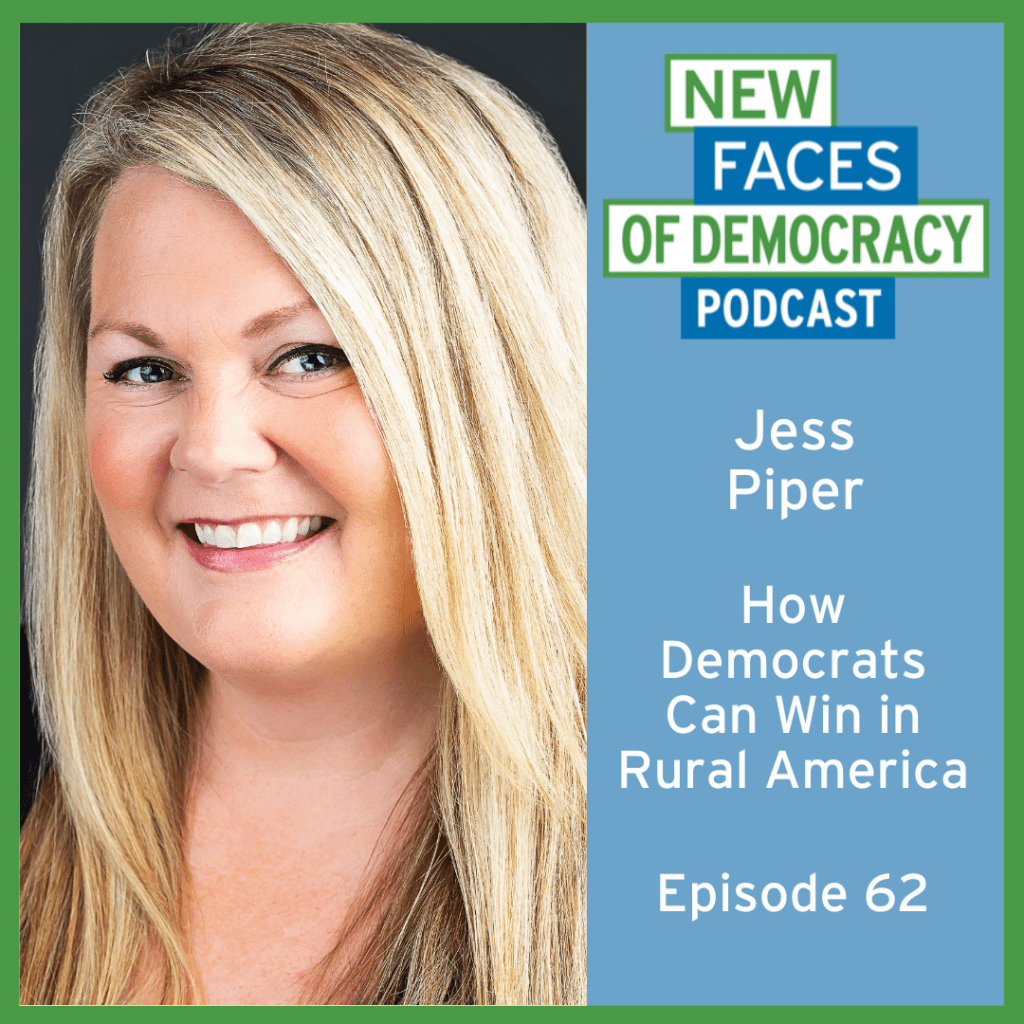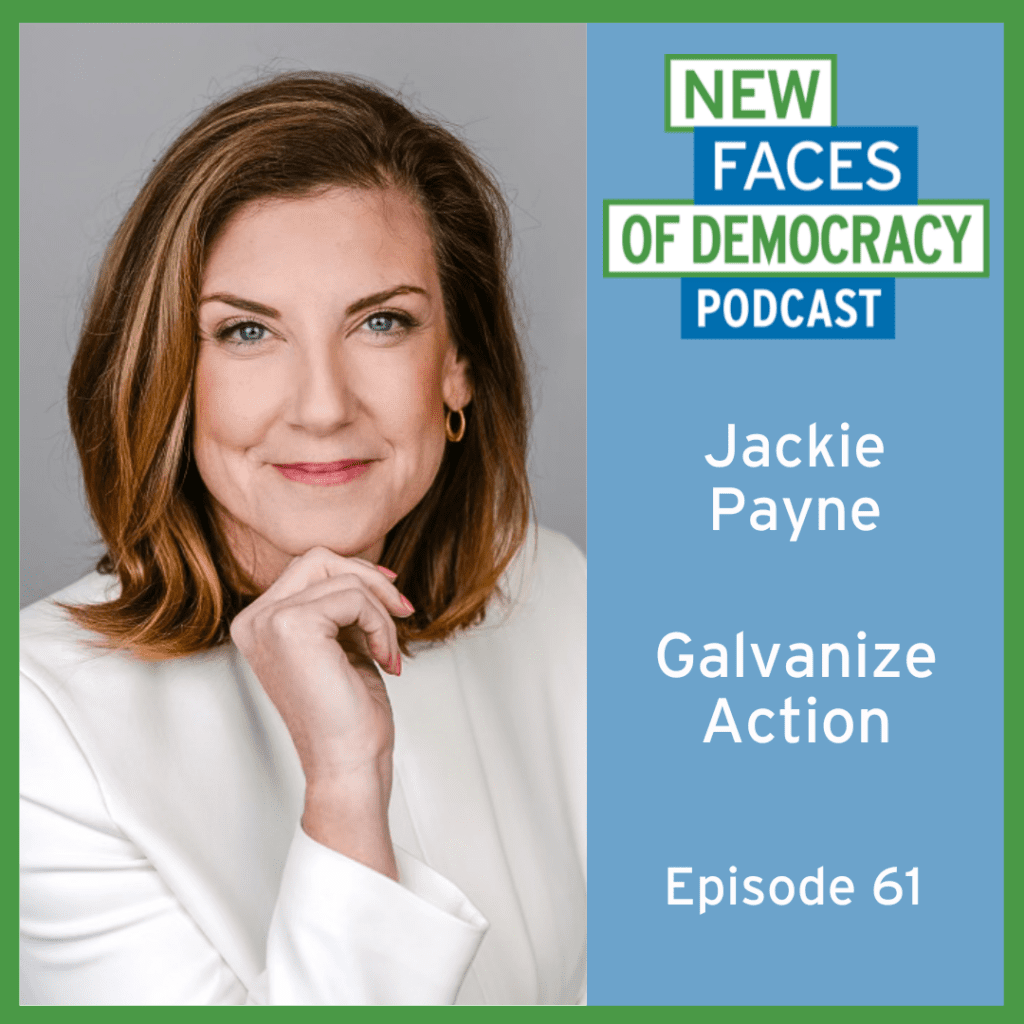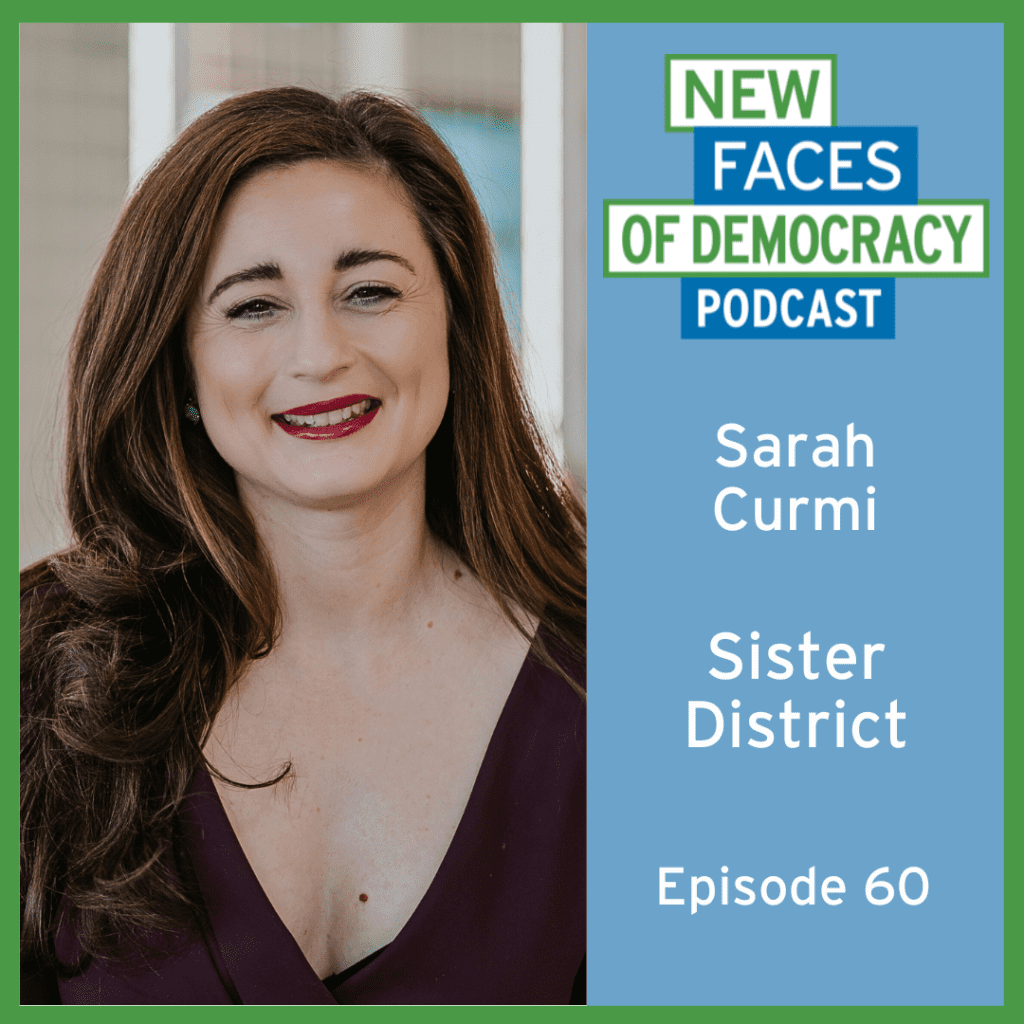In 2017, Tony McMullin, aka Tony the Democrat, got together with five friends to write postcards to Democrats, reminding them to vote in a special Congressional election in Tony’s home state of Georgia. Little did he know at the time but Tony had just started a movement that would transform elections and lives.
This race was the first chance to flip a Republican seat since the 2016 election, and it lit a fire under Democrats nationwide desperate to change the dynamic in Congress. People from all over the country wrote postcards for the Democrat, Jon Ossoff, and after just one month, Tony’s group had grown to 1,200 people. This Postcards to Voters was born.
Ossoff did not win that election, but Tony’s writers were just getting going so they started writing postcards for lesser races, and while not resulting in Democratic wins, they were forcing the Republican candidates had to work harder and spend more. It was the fourth postcard writing campaign for a state representative in Oklahoma where Tony started to see what he calls “the magic sauce.” A retired teacher was running for a special election, and the district had only 5,000 Democrats and 1,000 Independent voters. Tony’s group was able to write to each one of those voters. Twice. And the Democrat won by just 95 votes. Today Postcards to Voters has 60,000 members and counting.
I sat down to talk with Tony to learn more about postcarding, the phenomenon of postcard writing groups, the ripple effect and how to find joy and delight in the Trump era.
NFD: What exactly is “postcarding”?
Tony: Postcards to Voters are friendly reminders to Democrats to vote in an upcoming election. We only write positive messages, no mentions of Trump, Republicans or the opponent. We believe that such positive affirmations are good for our volunteers writing these messages over and over and who, each time they write a postcard, can envision the person’s experience reading it. The postcards are all different, handwritten and do not look like mass mailings. The reader can tell by the handwriting, the smudges, maybe even the mistakes, that someone put real time into it.
Postcarding is a grassroots, activist, liberal movement that appeals to many different kinds of people. We all have the same mission. We don’t want to just resist the harmful policies of the Trump administration but know that we also need to elect Democrats up and down the ballot. A lot of people are finally realizing that our local positions — school board, sheriff, district attorney, city council — are making policies that are probably affecting our daily lives much more significantly than what’s coming out of Washington DC. Whether it’s transgender bathrooms, hiring policies for police, extending same sex health benefits to city employees or contractors, I could go on. This is much more about a movement for protecting America, protecting democracy.
NFD: Do you ever send postcards to Republicans or try to change people’s minds?
Tony: We try to only write to friendly Democratic voters, because when someone is receiving a postcard from out of state and you don’t know where their head is at, you don’t know how they will receive it. They are just reminders of an upcoming election and not meant to persuade or switch a voter’s ideology. There is a place for that kind of work, and it is the campaign’s job. Persuasion messaging is a science best left to experts in that area. But we have never had a single complaint from a Democratic voter.
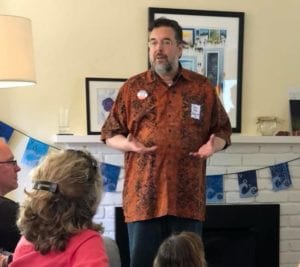
NFD: Postcarding has become a catalyst for real community building. What are some of your favorite stories about the phenomenon of postcard writing groups?
Tony: I’m getting goosebumps just talking about this. It is a completely unintended consequence, a lovely, beautiful benefit that is happening all around the country. Some examples that come to mind: a volunteer named Kaye contacted me who lives in an assisted living center in Florida. She had started writing postcards to voters on her own in the common area of the facility and people started asking her what she was doing. A few wanted to help, so she asked me for more addresses. Soon she had a group meeting regularly once a month. Then she started up a postcard group in a neighboring community. Now she has four different postcard writing groups, each meeting regularly and producing on average over 2000 postcards a month.
Then there’s the story of the group in Texas. We wrote postcards for Cecil Webster, running in a ruby red district in a special election for state legislature. The chances of him being able to flip that seat the first time were really slim, but we didn’t have any other elections going on so we wrote for him. We ended up finishing the list of registered Democrats which was fantastic. He didn’t win but about a month later, I got an email from somebody who identified herself as a member of a “secret Democratic women’s club.” It’s secret because they are worried about their jobs or their businesses (or their husband’s) if people find out they are Democrats. So they meet in secret, 135 of them.
They were so touched that they had each received a postcard from around the country. Our postcards are not written identically and they’re not the same postcard either so it really is this wonderful diversity of messaging that’s coming into the community over several days. And if you don’t know it’s about to happen, imagine yourself in this red, red community, and you get a postcard from out of state. And you tell your friend and she says, “You know I got one yesterday.” And all of a sudden, everyone is looking in their mailboxes waiting for their postcard to arrive. It’s this buzz created on top of the regular messaging, because now there is all this communication going on about the campaign. which just further enhances what I hope is a boost in winning turnout.
After the election, these women decided it was such a unique gesture that at their monthly meeting they would make a commitment to write 1000 postcards for whatever campaign we were running at the time.
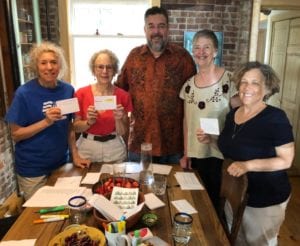
NFD: How do you choose your postcard writing campaigns?
Tony: We mostly like to write to campaigns that want our help. We get lots of requests from all over the place. We look at each opportunity, we consider the challenge. If it happens at a time when nothing else is going on, then it’s an easy decision. I always interview the candidate or campaign manager. I’ve been working on campaigns since 2003 so I can ask questions and determine how legitimate their candidacy is. Postcarding cannot be the end all for a candidate to win. Ours is just a little bit of a turnout boost. It’s important for me to understand everything else that they’re doing.
NFD: It doesn’t seem like you always write for people who have a strong chance of winning, like the Democrat in the ruby red district in Texas.
Tony: That’s a good way of putting it and you’re right. If you look back at our history, we have many candidates that ended up winning but if you had only looked at the numbers on paper in advance where maybe Trump had won by double digits, there was no way you would have written for them.
I grew up in politics in Dallas County, Texas which when I started was a red county with no elected Democrats. By the time I left, it was completely blue and there weren’t any Republican county-wide elected officials. I know that it takes time to build that base and activate them and get them in the habit of voting. And so I can see the long game. And when somebody comes to me, like Cecil Webster in Texas, I’m not disillusioned into thinking, “Ooh if we write to every voter twice, he’ll win.” That’s naive. But if we don’t help him now, when he needs the help, what’s going to happen in two years? Do we think that any Democrat is going to stick their neck out and sacrifice what it takes to run if they see that nobody is going to support them? We have to support these brave Democratic candidates who know it’s an uphill battle. They’re not foolish people, just because they’re running for a seat where Trump won by 80 points. We have to show the Democrats in that district that there is another option. To live in Texas your whole adult voting life and to so often never even see a Democrat challenging a Republican incumbent, it’s demoralizing. You can’t help but imagine what’s that doing to the Democrats who live there, how they feel, and if they are starting to second guess themselves. So I’m quite okay with what we are doing.
We have 77 wins and 94 losses so far, but some of those losses I don’t consider losses. I tell people that every single postcard campaign we’ve done has been a success. Because even when the campaigns don’t take home a win, every Democrat in that district has received a card from somebody, and you never know where the ripples are going to stop spreading. Maybe one of those people got a postcard and they signed up to volunteer with us. Then maybe another one decided, “Well gosh, I’m going to create a postcard writing group.” And you can’t tell what will happen in two or three years, who’s going to run for office.
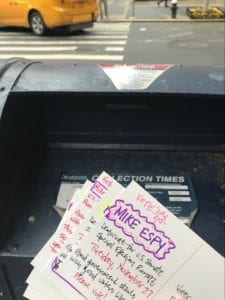
NFD: How are you going to pick races in 2020 when we have so many?
Tony: We won’t do the presidential election, I don’t think Democrats need any help remembering that one. For the November 2018 midterms, we had over 800 campaigns reach out to us. Obviously we couldn’t do that many but we did as many as we could with the volunteers we had. We wrote 1.9 million postcards in September and October for 32 campaigns, including the Tennessee Senate and Georgia gubernatorial races (over 600,000 postcards for Stacey Abrams alone). We wrote heavily into Florida for Andrew Gillum and for the Second Chances Amendment which did pass and which will have a huge tail into 2020.
We doubled in size after the November midterms so now we have 60,000 volunteers. The upcoming North Carolina congressional redo will be like a Doug Jones or Conor Lamb kind of election where people from all over the country are going to find out about us for the first time. These kinds of elections help us grow our numbers which puts us in a better position to increase our bandwidth for the next general election. I’m never going to be disappointed that we are not writing for every single Democrat that’s running in every single election, that’s unreasonable. I’m just pleased that the volunteers continue to find joy and delight in what they’re doing with us. They’re growing by telling their friends and recruiting people. So whatever writing capacity we are at when 2020 comes around, we will try to be judicious and fair and pick a good diversity of office types and candidate types.
What’s different about our approach is that we are all in when we support a candidate, which means we want to write to every friendly voter on that list. Typically the roadmap for campaigns is to target the Democrats who vote regularly. But for all the other Democrats who are infrequent voters, the campaign doesn’t have the money or manpower to reach out to those people. I tell the campaigns to give me a list with every Democratic voter. In this day of post-Trump, these infrequent voters are ready to be in the first group and we want to reach out to them as well. We want to saturate that district of Democrats with our reminders.
NFD: You started with five postcards for Jon Ossoff and grew very quickly. How did you scale up to that transition? I’ve seen so many new groups that burst onto the scene post-Trump but ultimately fell by the wayside because they didn’t have the bandwidth to manage the growth. How did you?
Tony: My professional background is in process improvement and business analysis, looking at high volume transactions, whether it’s in the mailroom or call center. I’ve worked in banking and insurance services, so I was always trying to find a way to streamline a tedious, day-in, day-out kind of a thing with a combination of either software or human reengineering process, trying to find the easiest way to make sure all those widgets get done consistently. I do believe that prepared me for thinking of the best way to manage the back and forth with all these people and all these different campaigns. I always have had an eye towards how are we going to implement this even though it’s this many people now, what if it’s 10,000 or 100,000 people later? It has to be something that can fit and scale.
The other thing that has helped is that I wasn’t brand new to volunteer coordination in a campaign style. I was the Dallas County volunteer coordinator for the Howard Dean campaign in 2003 with 1,200 volunteers. So working with volunteers, corralling all their energy and putting them into useful endeavors was not new to me. I think the combination of those two aspects of what I’ve done in the past helped us build something that was resilient and scaleable.
NFD: Postcard writers get their addresses from Abby the Address bot. How did Abby come about and how has she helped?
Tony: Just by luck. I was at a Move On meeting, and I was seated next to a guy who said his job is to help companies implement interactive texting solutions for their customers. After the meeting, I told him, ‘I have this idea, tell me if it’s reasonable.” So he created Abby for our second campaign and clearly if we did not have Abby we would not have been able to do the 30,000 – 60,000 addresses a day we were doing before the midterms. In the Doug Jones race, we wrote 437,000 addresses in six weeks. That would not have been possible without Abby. So thank goodness somebody invited me to that meeting!
NFD: How do you raise money?
Tony: We don’t have a lot of expenses. I left my regular job in order to focus full time on the midterms but we don’t have a large overhead, there’s no office, and everybody else is volunteering. We put some things in place on the website for individual and recurring monthly donations. We also sell postcards. I’m not closed to the idea of major donations for expansion but I’m not a business development person. I think it’s inevitable that one of these days someone will come up to me and say, “I’ve been watching you, you guys have been steady and consistent, you’re not trying to be all things to all people,” and that they will share the vision. I know there is a lot of room to grow. 60,000 people is a lot of people but there are a lot more volunteers out there who don’t know about us.
Ready to start postcarding? Go to www.postcardstovoters.org or text JOIN to (484) 275-2229.
